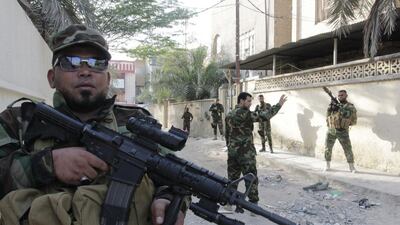BAGHDAD // The spiritual leader of Iraq’s Shiite majority has called for a new, “effective” government, increasing pressure on the country’s prime minister as an offensive by Sunni militants rages on.
Grand Ayatollah Ali Al Sistani’s comments at Friday prayers contained thinly veiled criticism that the Shiite prime minister Nouri Al Maliki, in office since 2006, was to blame for the nation’s crisis over the blitz by the Al Qaeda-inspired Islamic State of Iraq and the Levant (ISIL).
While Mr Al Maliki’s State of Law bloc won the most seats in parliament in the Iraq’s April 30 election, he now faces opponents bolstered by criticism on Thursday from the US president Barack Obama.
And with Iraq now asking the US for airstrikes to temper the militants’ advance – especially as they apparently prepared Friday to again assault the country’s biggest oil refinery – Mr Al Maliki appears increasingly vulnerable.
“It is necessary for the winning political blocs to start a dialogue that yields an effective government that enjoys broad national support, avoids past mistakes and opens new horizons toward a better future for all Iraqis,” Ayatollah Al Sistani said in a message delivered by his representative Ahmed Al Safi in the holy city of Karbala.
Iraq’s newly elected parliament must meet by June 30 to elect a speaker and a new president, who in turn will ask the leader of the largest bloc to form a new government.
With Iraq in turmoil, Mr Al Maliki’s rivals have mounted a campaign to force him out of office, with some angling for support from western backers and regional heavyweights. On Thursday, their effort received a massive boost from Mr Obama, who said: “Only leaders that can govern with an inclusive agenda are going to be able to truly bring the Iraqi people together and help them through this crisis.”
Mr Al Maliki has been accused of following sectarian plicies that have fuelled anger among the Sunni minority and turned their sympathies towards Sunni insurgents.
The problem came into sharp focus last week when militants led by ISIL seized the northern town of Mosul and began a sweep south through predominantly Sunni areas. The Shiite-dominated army initially offered liitle or no resistance, allowing the rebels to capture more towns and cities and come to with 60 kilometres of the capital.
The most recent fighting has seen the militants trying to wrest control of the Baiji oil refinery north of Baghdad, Iraq’s largest, and the military attempting to retake the city of Tal Afar in north-west.
Militants on Friday killed 34 Iraqi security forces members in Al Qaim, a town on the Syrian border.
The fighting broke out late Thursday night and continued until around noon on Friday, with militants in control of most of the town.
The identity of the militants was not immediately clear, but one official appealed to the government for arms “stronger than the weapons that ISIL has”.
ISIL has also seized large parts of eastern Syria, where it is waging war against the president Bashar Al Assad as well as rival rebel groups opposed to its extremist ideology.
The Britain-based observatory for human rights, which monitors the civil war in Syria, said ISIL had captured key towns in eastern Syria adjoining territory the group has seized in Iraq.
The Islamists, whose stated aim is to create a strict Islamic state straddling national borders, took over the towns of Muhassan, Albulil and Albuomar in Deir Ezzor province, the Observatory said.
The newly captured towns are in an area running along the Euphrates River that links Syria and Iraq and are significant because they are close to Deir Ezzor ’s military airport and the Syrian city of Al Mayadin, the Observatory’s director, Rami Abdurrahman, said.
“If you control Al Mayadin, this means there are no more important cities except Abu Kamal out of [ISIL] control” in the province, he said, referring to another town close to the Syria-Iraq border. “They are pushing forward.”
Muhassan, which is just over 100km from the border with Iraq, is an important position for any attempt to capture the airport, he added.
Also on Friday, the militants attacked the town of Muqdadiyah north-east of Baghdad, sparking clashes that killed 30 Shiite militiamen, a police colonel and a doctor said.
The fighting began in the morning and eased later in the day with security forces still in control of Muqdadiyah, a key approach to the Diyala provincial capital, Baquba, and militants deployed in adjoining areas.
* Associated Press and Agence France-Presse

